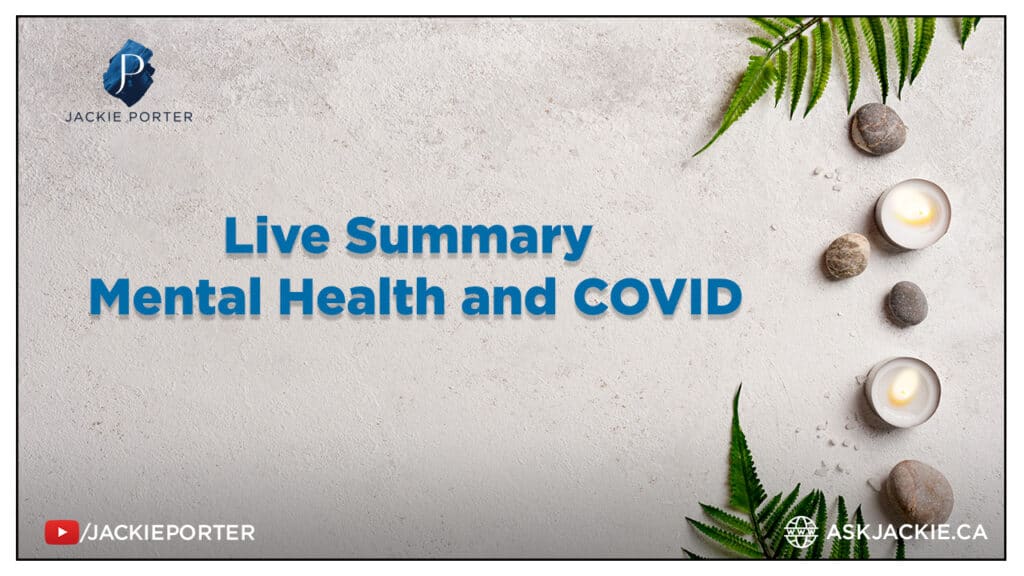One of the biggest but least discussed challenges of COVID is mental health. The pandemic brought many fears and challenges to our lives which all might severely impact our mental health. Despite the dramatically increasing number of people seeking COVID mental health resources, there is still a stigma around discussing mental health.
Fortunately, at Team Jackie Porter we are passionate about having uncomfortable and vulnerable conversations to improve our community for the better, so this week our Instagram Live topic was ‘Mental Health and COVID’ with our guests Greg Rennie from Hasu E-Clinic and Stephan Stewart from Quires Inc. We discussed the most common COVID mental health challenges, the importance of mindfulness and improving our mindset, the available resources to overcome our problems and where to find them.
What are the common COVID mental health challenges?
The most important thing to remember is that everyone is uniquely different and handles the challenges of COVID differently. However, there are still common mental health challenges. According to Greg who is the CEO of an e-mental health clinic, the most common problem at the beginning of the COVID outbreak was anxiety due to the unknown of what was to come. As we learned more about this pandemic and started adapting our lives to the new normal, we began to adapt. Recently, depression has become more observed among people who seek mental health resources according to Greg. This is due to some challenges becoming constant in some people’s lives. Also, the fear of the unknown in the near future still hasn’t passed as we still don’t have any sense when COVID will resolve itself.
What strategies do people with depression and anxiety take?
Greg also mentioned that anxiety and depression during COVID are about coming to terms with the unknown. Learning about what the anxiety is about is more important than treating the person as if they have a general anxiety problem. After understanding the clients, some of the strategies therapists like Greg provide are CBT (cognitive behavioural therapy), mindfulness, and dialectical behavioural therapy. The one most people are familiar with is mindfulness, which is about focusing someone’s awareness on the present moment while calmly acknowledging and accepting their feelings and thoughts.
What resources are available for mental health?
There are many online resources that are available and increasing due to the technological pivot COVID brought. There are many clinics that provide online consultation and therapy that significantly help with mental health challenges. Greg mentioned how his e-clinic increased the number of therapists to provide clients with an appointment within 24 hours.
There are also a large variety of online content on social media platforms about mindfulness. Just like Stephan’s informative Youtube videos and interactive e-book, you can find many resources that are very accessible and free on social media.
However, it’s important to note that access to these resources might not be the easiest.
Mental health services are becoming more widely approved by insurance companies but it’s not enough. Also, waitlists to see therapists are very long as there is a gap between the need and supply of these services. However, there are some services that might be covered by some insurance and professionals are working toward providing more available resources faster, just like Greg’s e-clinic that gives you access to a professional within 24 hours.
What can people do by themselves to improve their mental state?
1. Break the stigma around mental health.
Our guest Stephan focused on mindset. There is a stigma about mental health, but it is very important to have authentic conversations in order to overcome your challenges. Our society also needs to overcome the fear or shame when it comes to addressing mental health issues since it is very common. Being open, asking help and being kind to each other is very important to overcome these challenges together were some of the issues she talked about.
According to our expert guest, your personal network might be your best cure! Utilise your friends, family and others close to you. However, when you are offering help to others it’s important to actively listen to the person asking for support so they feel heard. Simply listening to them and talking openly about mental health is very important for both sides to improve their mindset.
2. Focus on Mindfulness:
How do you look at life? When you face a challenge, do you focus on the negatives or the positives that might come from it? How you look at the challenge will determine how long you will stay in the challenge. The more negative you think, the more you will neglect the positive things around that topic. Instead of focusing on what you haven’t done or the barriers you face, be thankful on the things you have achieved and how you got over previous barriers.
Stephan our guest emphasized that every thought we think creates a neuropathic pathway, the more we think negatively the more our brain will focus on it and lead us to act differently. Your own thoughts can lead your life and it’s important to use it to your advantage. Thinking good can attract good things to happen to us.
3. Change how you think.
Everything starts with a thought Stephan mentioned. We are not taught how to think, we are told what to think. As humans, we are reasonable and if we know the reasoning behind things, it’s easier to move thoughts into actions.
Stop complaining about the problem. The more you complain, the more negative pathways you create in your brain. We all love to call somebody and complain about our lives to others. However, this not only makes you focus on the negative but also causes the listener to create negative pathways of thinking. Instead of focusing on the problem and expecting the other person to agree with you, it’s more important to share your problem and ask for the listener’s insight and ideas on how to move forward.
4. Problem solve.
Without the belief that every challenge you face has a solution, you will not move forward. Our mind is powerful to create solutions, no matter how small or large. If you are not able to go to the gym, video call your friends to exercise together at home. If you prefer outdoors, you can meet with a friend at a park to exercise together. Taking walks and exploring parks help to calm down and get out of constant isolation. Surrounding yourself with others, even having small talk with strangers in a store might help you to get out of that isolation mindset that leads us to question things more.
We hope you enjoyed reading our blog about ‘Mental Health and COVID’! To learn more about our discussion, you can check the full live chat here. You can find more relevant content about the latest financial news and our live chats on our News Blog. Stay tuned to learn more tips on a new topic each week on our Instagram Live at 5 on Instagram! Aside from our live chats, we post daily financial updates on social media!





More Financial News & Events
Exploring Financial and Emotional Resilience
Mindshift Mastery and Emotional Resilience
Creating a mentor mindset: How to become one or find one
Jan
Legal Financial Fitness: A Comprehensive Checklist for Thriving Practices
Jan
How to Mentally and Financially Prepare for a Layoff
Jan
2023 tax considerations you may have missed
Dec
How to Hold on to More of Your Cash this Holiday Season
Dec
Financial Moves to Make Before Year End
Dec
Navigating Stagflation: Financial Resilience in Uncertain Times
Nov
Buying and selling real estate amidst inflation
Nov
Navigating the Changing Tides: Real Estate, Inflation, and Rising Mortgage Rates
Nov
How does inflation affect your financial plan?
Nov
Caring for aging parents: The journey and lessons learned along the way
Oct
Resources For managing care for Aging Parents
Oct
Talking to Aging Parents About Finances
Oct
Living your best life: Infusing your best life into your your everyday
Oct
Living your best life: Striking the balance between enjoying life now or enjoying it later
Sep
Living Your Best Life: Client Testimonials and Insights
Sep
Unpacking FOMO: Understanding biases, emotions and financial attitudes
Aug
How to overcome FOMO to not overspend this summer
Aug
How to Overcome FOMO on Investments
Aug
What behaviours undermine your ability to build wealth
Jul
How Do You Loose Wealth
Jul
What Does Wealth Building Mean to Our Clients?
Jul
Estate Planning: What You Can Learn From the Mistakes of Celebrities
Jun
Estate Planning For Lawyers
Jun
Estate Planning for Business Owners
Jun
Managing growth for business owners
May
Are you a lawyer with questions on how to grow your investments?
May
Cultivating a growth mindset around money
May
Why financial growth can be deceptive
May
Home and Financial Document Organization
Apr
Business owners, it’s time to start spring cleaning.
Apr
Spring Cleaning Your Finances
Apr
Unique financial challenges female lawyers face
Mar
Taking Action: A Woman’s Perspective on Deciding To Tackle Her Finances
Mar
Is there a gap in your income protection?
Mar
Knowing the difference between Tax Filer and Tax Advisor
Mar
Conquering Women’s Fears Around Finances
Mar
Trends in Family Law
Feb
PART 2: Financial Conversations Couples Need To Have at Different Life Stages
Feb
Financial Conversations Couples Need To Have at Different Life Stages
Feb
Disruption and Reinvention: Starting a Second Career in your Forties
Jan
How to create a strong financial fortress during market downturns
Jan
Creating a Financial Vision Board for 2023
Jan
5 Tips to set yourself up For Financial Success in 2023
Jan
Year-end Donation strategies
Dec
Year-end tax planning
Dec
Getting clients organized for 2023
Combating Quiet Spending
Nov